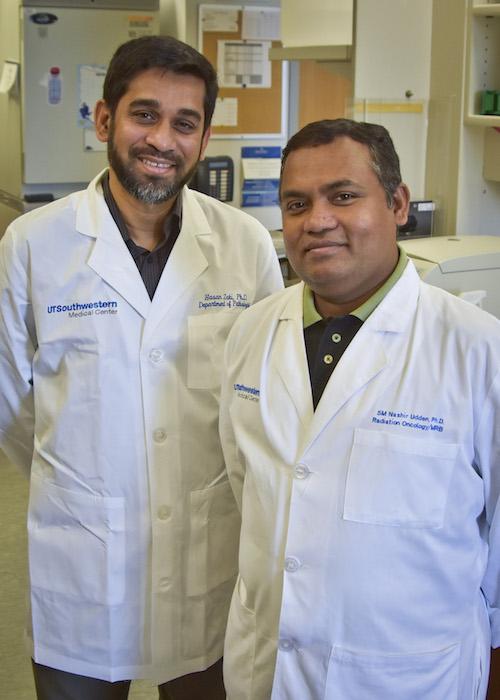
Credit: UTSW
DALLAS – April 15, 2019 – UT Southwestern researchers have found that a protein in the body’s innate immune system that responds to gut microbes can suppress the most common type of liver cancer.
The study, published today in the journal eLife, determined that NLRP12, an innate immune sensor, has a protective effect against hepatocellular carcinoma (HCC), a deadly human cancer associated with chronic inflammation. HCC is responsible for more than 80 percent of liver cancers in the U.S. It is the third-leading cause of cancer-related deaths worldwide and the ninth-leading cause in America, according to the National Cancer Institute.
NLRP12 is a member of the NOD-like family of pattern recognition receptors that help the body sense microbes and other stimuli within the cell to regulate the innate immune response – the body’s first line of defense against infection – in multiple ways. This latest work adds to a growing body of evidence connecting inflammation and the development of tumors in the liver.
“In this study, we demonstrated that NLRP12 responds to gut microbes and plays a critical role in suppressing a common form of liver cancer,” said Dr. Hasan Zaki, Assistant Professor of Pathology at UT Southwestern and corresponding author of the study.
Major risk factors for HCC include hepatitis B or C viral infection, chronic alcohol abuse, and nonalcoholic fatty liver disease, a condition increasing worldwide along with obesity. Although the precise mechanisms through which these conditions induce liver cancer are unknown, inflammation in the liver is considered a key player.
“Our study indicates that NLRP12 acts to suppress liver cancer by reducing inflammation and downregulating the signals involved in tumor progression,” said Dr. Zaki, whose laboratory conducted the experiments on mice and on human cells from liver cancer patients.
After being exposed to a chemical carcinogen, mice that were missing the Nlrp12 (mouse version) gene showed higher levels of inflammation and increased tumor development compared with normal mice, the study showed.
To understand why this occurred, the researchers looked at the signals sent by tumor cells in mice with and without the Nlrp12 gene. They found that the JNK (c-Jun N-terminal kinase) pathway – previously shown to be associated with liver cancer – is highly active in liver tumors that lack Nlrp12, Dr. Zaki said.
The JNK pathway can be activated by a component of bacterial cell walls called lipopolysaccharide (LPS), he said. Both “good” bacteria – which line the gut and aid in digestion – and “bad” pathogenic bacteria – such as the Salmonella or E. coli – can release LPS, Dr. Zaki explained.
The LPS can move from the gut to the liver via the bloodstream and contribute to inflammation by setting off the JNK and other signaling pathways. Such transport is much more common in chronically inflamed livers such as those of people suffering from hepatitis or fatty liver disease, he said.
The study data suggest that NLRP12 suppresses inflammation caused by gut microbiota and cancer-promoting signals, added Dr. Zaki, a member of the Harold C. Simmons Comprehensive Cancer Center.
To confirm the gut-liver inflammation-cancer hypothesis, the researchers treated mice with antibiotics to reduce levels of gut bacteria. “Depletion of gut microbiota with antibiotics dramatically reduced tumor growth in mice without Nlrp12,” Dr Zaki said. “This study suggests that NLRP12 could be a potential therapeutic target. It also indicates that finding a way to increase NLRP12 in the liver in combination with current immune checkpoint blockade therapies may improve liver cancer treatment.”
Immune checkpoint blockade is a new strategy for helping the body kill cancer cells through an immune response. When the strategy works, it is very effective, but it is often ineffective, causing researchers to seek ways to improve it.
Dr. Zaki said his team is now further exploring the precise mechanism through which NLRP12 regulates the JNK pathway.
###
UTSW co-authors include: lead author Dr. SM Nashir Udden, a former postdoctoral researcher in the Zaki lab and now an Instructor in Radiation Oncology; Dr. Youn-tae Kwak, a Research Associate in the Zaki lab and Senior Scientist in Biochemistry; Research Assistant Victoria Godry; Dr. Shahanshah Khan, postdoctoral research associate in the Zaki lab; Nicholas Loof, Manager of shared facilities at the Children’s Medical Center Research Institute at UT Southwestern (CRI); Dr. Lan Peng, Associate Professor of Pathology at UTSW; and Dr. Hao Zhu, Associate Professor at CRI and of Internal Medicine and Pediatrics at UTSW.
Dr. Md Abdul Wadud Khan of MD Anderson Cancer Center, Houston, also participated in the study.
The study received support from the Cancer Prevention and Research Institute of Texas (CPRIT) and from UT Southwestern.
About UT Southwestern Medical Center
UT Southwestern, one of the premier academic medical centers in the nation, integrates pioneering biomedical research with exceptional clinical care and education. The institution’s faculty has received six Nobel Prizes, and includes 22 members of the National Academy of Sciences, 17 members of the National Academy of Medicine, and 15 Howard Hughes Medical Institute Investigators. The full-time faculty of more than 2,500 is responsible for groundbreaking medical advances and is committed to translating science-driven research quickly to new clinical treatments. UT Southwestern physicians provide care in about 80 specialties to more than 105,000 hospitalized patients, nearly 370,000 emergency room cases, and oversee approximately 3 million outpatient visits a year.
Media Contact
Deborah Wormser
[email protected]
Original Source
https:/




